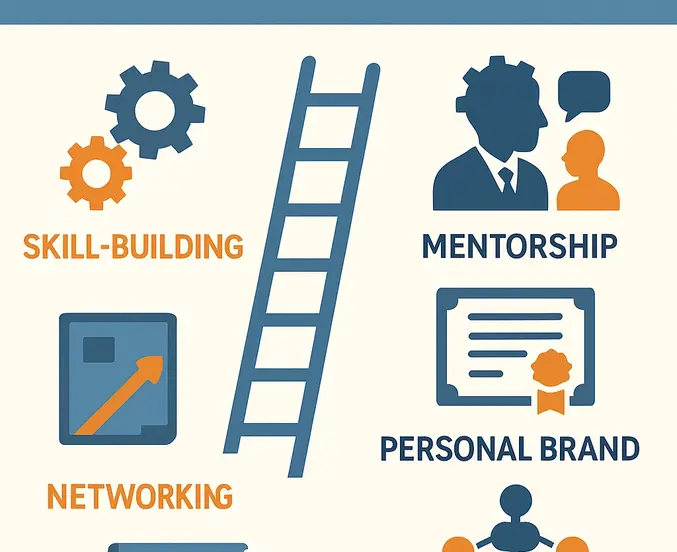Why Engineering Professional Growth is Critical for Career Success
In today’s rapidly evolving technological landscape, engineering professional growth has become more than just a career enhancement—it’s a fundamental requirement for survival and success. As industries continue to face unprecedented challenges and technological disruptions, engineers who prioritize their professional development are finding themselves at a significant advantage in the competitive job market.
The engineering field is experiencing a transformation unlike any other period in history. With new technologies emerging at breakneck speed, traditional skill sets are becoming obsolete faster than ever before. This reality has made engineering professional growth not just beneficial but essential for maintaining relevance and advancing in the field.
According to recent research from McKinsey Global Institute, 87% of engineering roles will require significant skill updates by 2030, making continuous professional development crucial for career longevity.
The Evolution of Engineering Skills in the Digital Age
The engineering profession has undergone a dramatic transformation over the past decade. What once required primarily technical expertise now demands a comprehensive skill set that includes digital literacy, project management, and leadership capabilities. This shift has made engineering professional growth more complex and multifaceted than ever before.
Traditional engineering roles focused heavily on technical problem-solving and design. However, modern engineering positions require professionals to navigate complex project environments, manage diverse teams, and integrate cutting-edge technologies into their work processes. This evolution has created new opportunities for engineers who are willing to invest in their professional development.
The Impact of Technology on Engineering Professional Growth
Technology continues to reshape the engineering landscape at an unprecedented pace. From artificial intelligence and machine learning to advanced simulation tools and collaborative platforms, engineers must constantly update their knowledge to remain effective in their roles. This technological evolution has made engineering professional growth not just a career choice but a professional necessity.
The integration of digital tools into engineering workflows has created new specializations and career paths. Engineers who embrace these changes and invest in learning new technologies often find themselves leading innovation initiatives within their organizations. This proactive approach to engineering professional growth can open doors to exciting opportunities and higher compensation.
Building a Comprehensive Professional Development Strategy
Successful engineering professional growth requires a strategic approach that addresses both technical and soft skills. Engineers must develop a balanced skill set that includes technical expertise, leadership capabilities, and business acumen to thrive in today’s competitive environment.
Technical Skill Enhancement
The foundation of engineering professional growth lies in maintaining and expanding technical competencies. This involves staying current with industry standards, learning new software tools, and understanding emerging technologies relevant to your field. Engineers who prioritize technical skill development often find themselves better positioned for advancement opportunities.
Our comprehensive guide on essential skills for the 21st century provides detailed insights into the technical competencies that modern engineers need to develop for career success.
Continuous learning in technical areas can take many forms, from formal education programs to hands-on project experience. Engineers should seek opportunities to work with new technologies, participate in industry conferences, and engage with professional communities to expand their technical knowledge base.
Leadership and Communication Development
Engineering professional growth extends far beyond technical skills. Modern engineering roles increasingly require leadership capabilities and strong communication skills. Engineers who can effectively lead teams, communicate complex concepts to diverse audiences, and manage stakeholder relationships are highly valued in today’s workplace.
Developing leadership skills involves taking on project management responsibilities, mentoring junior engineers, and participating in cross-functional teams. These experiences not only enhance your professional profile but also prepare you for senior-level positions within your organization.
Hiring? Post Jobs for Free with WhatJobs
Looking to hire skilled engineers for your organization? WhatJobs makes it easy to post engineering positions and connect with qualified professionals who prioritize their professional development. Post your engineering opportunities for free and find the talent you need to drive innovation and success.
Industry Examples of Successful Professional Growth Programs
Leading engineering organizations have recognized the importance of professional development and have implemented comprehensive programs to support their engineers’ growth. These initiatives serve as excellent examples of how engineering professional growth can be structured and supported within organizations.
KPFF Consulting Engineers: Mentorship and Career Advancement
KPFF Consulting Engineers has established a robust mentorship program that exemplifies effective engineering professional growth support. Their approach focuses on pairing experienced engineers with developing professionals, creating a knowledge transfer system that benefits both mentors and mentees. This structured approach to professional development has resulted in higher retention rates and improved project outcomes.
The success of KPFF’s program demonstrates how organizations can create environments that foster engineering professional growth while simultaneously improving organizational performance. Their commitment to continuous learning has positioned them as an industry leader in professional development.
Boeing’s Leadership Development Initiatives
Boeing’s comprehensive engineering professional growth programs showcase how large organizations can support career advancement at scale. Their initiatives include technical training programs, leadership development courses, and rotational assignments that expose engineers to different aspects of the business. This multifaceted approach ensures that engineers develop both technical and business acumen.
The company’s focus on expanding knowledge and leadership skills has enabled many engineers to transition effectively into new roles and take on greater responsibilities. Boeing’s success in this area highlights the importance of structured professional development programs in large engineering organizations.
L3 Harris Technologies: Senior Leadership Development
At L3 Harris Technologies, senior engineers play crucial roles in leading large-scale projects while mentoring others. This approach to engineering professional growth creates a culture where experienced professionals share their knowledge while continuing to develop their own skills. The company’s emphasis on project leadership and mentorship has created a pipeline of qualified leaders.
This model demonstrates how engineering professional growth can be integrated into daily work activities, making professional development a natural part of career progression rather than an additional burden.
The Financial and Career Benefits of Professional Growth
Investing in engineering professional growth yields significant returns in terms of career advancement, compensation, and job security. Engineers who prioritize their development often experience faster career progression and higher earning potential than their peers who focus solely on technical skills.
Salary and Compensation Advantages
Research consistently shows that engineers who invest in professional development earn significantly higher salaries than those who do not. According to a study by Harvard Business Review, engineers who participate in continuous learning programs see an average salary increase of 15-25% over their peers who do not engage in professional development.
This financial advantage extends beyond base salary to include bonuses, stock options, and other compensation elements. Organizations value engineers who demonstrate commitment to their professional growth and are willing to compensate them accordingly.
Enhanced Job Security and Marketability
Engineering professional growth also provides significant job security benefits. In an industry where technological obsolescence is a constant threat, engineers with updated skills are more valuable to their organizations and more attractive to potential employers. This marketability provides protection against layoffs and creates opportunities for career advancement.
Engineers who maintain current skills and develop new competencies are better positioned to navigate industry disruptions and economic downturns. Their adaptability makes them essential assets to their organizations and highly sought after in the job market.
Overcoming Common Challenges in Professional Development
While engineering professional growth offers numerous benefits, many engineers face challenges in pursuing their development goals. Understanding these obstacles and developing strategies to overcome them is crucial for successful career advancement.
Time Management and Work-Life Balance
One of the most significant challenges engineers face in pursuing professional growth is finding time for development activities while maintaining work and personal commitments. This challenge requires careful planning and prioritization to ensure that professional development activities fit into busy schedules.
Successful engineers often integrate learning into their daily work activities, seeking opportunities to develop new skills through project work and collaboration. This approach makes professional development more sustainable and less disruptive to work-life balance.
Identifying Relevant Development Opportunities
With countless professional development options available, engineers often struggle to identify which opportunities will provide the greatest return on investment. This challenge requires careful assessment of current skills, career goals, and industry trends to make informed decisions about development priorities.
Our guide on mastering LinkedIn algorithm for job search success provides valuable insights into how engineers can leverage professional networking to identify and pursue relevant development opportunities.
Creating a Personalized Professional Growth Plan
Effective engineering professional growth requires a personalized approach that aligns with individual career goals and organizational needs. Engineers should develop comprehensive development plans that address both short-term skill gaps and long-term career aspirations.
Assessing Current Skills and Identifying Gaps
The first step in creating an effective professional growth plan is conducting a thorough assessment of current skills and identifying areas for improvement. This assessment should include technical skills, soft skills, and industry knowledge relevant to your specific engineering discipline.
Engineers should seek feedback from supervisors, colleagues, and mentors to gain a comprehensive understanding of their strengths and development areas. This feedback provides valuable insights that can guide professional development priorities.
Setting Clear Development Goals
Once skills gaps are identified, engineers should set clear, measurable development goals that align with their career aspirations. These goals should be specific, achievable, and time-bound to ensure accountability and progress tracking.
Development goals should address both technical and non-technical skills, recognizing that modern engineering roles require a balanced skill set. Goals might include obtaining certifications, developing leadership capabilities, or gaining experience with new technologies.
The Role of Continuous Learning in Engineering Success
Engineering professional growth is not a one-time event but a continuous process that spans an entire career. Successful engineers recognize that learning never stops and actively seek opportunities to expand their knowledge and skills throughout their professional lives.
Embracing Lifelong Learning
The concept of lifelong learning is particularly relevant in engineering, where technological advancements constantly create new knowledge requirements. Engineers who embrace this mindset are better positioned to adapt to industry changes and maintain their competitive advantage.
Lifelong learning can take many forms, from formal education programs to informal learning through professional networks and industry publications. The key is maintaining curiosity and a commitment to continuous improvement.
Leveraging Technology for Learning
Modern technology provides unprecedented opportunities for engineering professional growth. Online learning platforms, virtual conferences, and digital collaboration tools make it easier than ever for engineers to access high-quality educational content and connect with industry experts.
Engineers should explore these technological resources to enhance their learning experiences and make professional development more accessible and convenient. These tools can significantly accelerate skill development and career advancement.
Conclusion: Investing in Your Engineering Future
Engineering professional growth is not just a career enhancement strategy—it’s an essential component of long-term success in the engineering field. As technology continues to evolve and industries face new challenges, engineers who prioritize their development will find themselves better positioned for career advancement and job security.
The benefits of engineering professional growth extend far beyond individual career success. Organizations that support and encourage professional development often experience improved project outcomes, higher employee retention, and enhanced innovation capabilities. This creates a win-win situation for both engineers and their employers.
Ready to take the next step in your engineering career? Search for engineering opportunities on WhatJobs to find positions that align with your professional growth goals and career aspirations.






